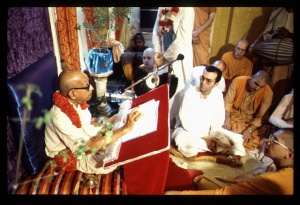SB 7.12.7: Difference between revisions
m (1 revision(s)) |
No edit summary |
||
| Line 1: | Line 1: | ||
{{info | {{info | ||
|speaker= | |speaker=Nārada Muni | ||
|listener=King | |listener=King Yudhiṣṭhira | ||
}} | }} | ||
[[Category:Srimad-Bhagavatam - Canto 07 Chapter 12|s07 ]] | |||
[[Category:Bhagavatam Verses Spoken by Narada Muni - Vanisource|071207]] | |||
<div style="float:left">'''[[Srimad-Bhagavatam]] - [[SB 7|Seventh Canto]] - [[SB 7.12: The Perfect Society: Four Spiritual Classes|Chapter 12: The Perfect Society: Four Spiritual Classes]]'''</div> | |||
<div style="float:right">[[File:Go-previous.png|link=SB 7.12.6]] '''[[SB 7.12.6]] - [[SB 7.12.8]]''' [[File:Go-next.png|link=SB 7.12.8]]</div> | |||
{{RandomImage}} | |||
==== TEXT 7 ==== | ==== TEXT 7 ==== | ||
<div | <div class="verse"> | ||
varjayet pramadā-gāthām | :varjayet pramadā-gāthām | ||
agṛhastho bṛhad-vrataḥ | :agṛhastho bṛhad-vrataḥ | ||
indriyāṇi pramāthīni | :indriyāṇi pramāthīni | ||
haranty api yater manaḥ | :haranty api yater manaḥ | ||
</div> | </div> | ||
| Line 17: | Line 22: | ||
==== SYNONYMS ==== | ==== SYNONYMS ==== | ||
<div | <div class="synonyms"> | ||
''varjayet''—must give up; ''pramadā-gāthām''—talking with women; ''agṛhasthaḥ''—a person who has not accepted the gṛhastha-āśrama (a brahmacārī or sannyāsī); ''bṛhat-vrataḥ''—invariably observing the vow of celibacy; ''indriyāṇi''—the senses; ''pramāthīni''—almost always unconquerable; ''haranti''—take away; ''api''—even; ''yateḥ''—of the sannyāsī; ''manaḥ''—the mind. | |||
</div> | </div> | ||
| Line 24: | Line 29: | ||
==== TRANSLATION ==== | ==== TRANSLATION ==== | ||
<div | <div class="translation"> | ||
A brahmacārī, or one who has not accepted the gṛhastha-āśrama [family life], must rigidly avoid talking with women or about women, for the senses are so powerful that they may agitate even the mind of a sannyāsī, a member of the renounced order of life. | A brahmacārī, or one who has not accepted the gṛhastha-āśrama [family life], must rigidly avoid talking with women or about women, for the senses are so powerful that they may agitate even the mind of a sannyāsī, a member of the renounced order of life. | ||
</div> | </div> | ||
| Line 31: | Line 36: | ||
==== PURPORT ==== | ==== PURPORT ==== | ||
<div | <div class="purport"> | ||
Brahmacarya essentially means the vow not to marry but to observe strict celibacy (bṛhad-vrata). A brahmacārī or sannyāsī should avoid talking with women or reading literature concerning talks between man and woman. The injunction restricting association with women is the basic principle of spiritual life. Associating or talking with women is never advised in any of the Vedic literatures. The entire Vedic system teaches one to avoid sex life so that one may gradually progress from brahmacarya to gṛhastha, from gṛhastha to vānaprastha, and from vānaprastha to sannyāsa and thus give up material enjoyment, which is the original cause of bondage to this material world. The word bṛhad-vrata refers to one who has decided not to marry, or in other words, not to indulge in sex life throughout his entire life. | ''Brahmacarya'' essentially means the vow not to marry but to observe strict celibacy ''(bṛhad-vrata)''. A ''brahmacārī'' or ''sannyāsī'' should avoid talking with women or reading literature concerning talks between man and woman. The injunction restricting association with women is the basic principle of spiritual life. Associating or talking with women is never advised in any of the Vedic literatures. The entire Vedic system teaches one to avoid sex life so that one may gradually progress from ''brahmacarya'' to ''gṛhastha,'' from ''gṛhastha'' to ''vānaprastha'', and from ''vānaprastha'' to ''sannyāsa'' and thus give up material enjoyment, which is the original cause of bondage to this material world. The word ''bṛhad-vrata'' refers to one who has decided not to marry, or in other words, not to indulge in sex life throughout his entire life. | ||
</div> | </div> | ||
__NOTOC__ | |||
<div style="float:right; clear:both;">[[File:Go-previous.png|link=SB 7.12.6]] '''[[SB 7.12.6]] - [[SB 7.12.8]]''' [[File:Go-next.png|link=SB 7.12.8]]</div> | |||
__NOTOC__ | |||
__NOEDITSECTION__ | |||
Revision as of 12:20, 3 June 2021

A.C. Bhaktivedanta Swami Prabhupada
TEXT 7
- varjayet pramadā-gāthām
- agṛhastho bṛhad-vrataḥ
- indriyāṇi pramāthīni
- haranty api yater manaḥ
SYNONYMS
varjayet—must give up; pramadā-gāthām—talking with women; agṛhasthaḥ—a person who has not accepted the gṛhastha-āśrama (a brahmacārī or sannyāsī); bṛhat-vrataḥ—invariably observing the vow of celibacy; indriyāṇi—the senses; pramāthīni—almost always unconquerable; haranti—take away; api—even; yateḥ—of the sannyāsī; manaḥ—the mind.
TRANSLATION
A brahmacārī, or one who has not accepted the gṛhastha-āśrama [family life], must rigidly avoid talking with women or about women, for the senses are so powerful that they may agitate even the mind of a sannyāsī, a member of the renounced order of life.
PURPORT
Brahmacarya essentially means the vow not to marry but to observe strict celibacy (bṛhad-vrata). A brahmacārī or sannyāsī should avoid talking with women or reading literature concerning talks between man and woman. The injunction restricting association with women is the basic principle of spiritual life. Associating or talking with women is never advised in any of the Vedic literatures. The entire Vedic system teaches one to avoid sex life so that one may gradually progress from brahmacarya to gṛhastha, from gṛhastha to vānaprastha, and from vānaprastha to sannyāsa and thus give up material enjoyment, which is the original cause of bondage to this material world. The word bṛhad-vrata refers to one who has decided not to marry, or in other words, not to indulge in sex life throughout his entire life.